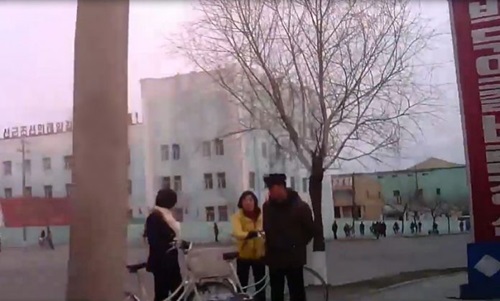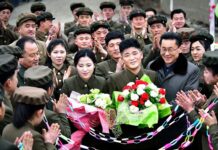
North Korea enacted the “Social Security Regulation Act” in 2020 around the same time that it changed the name of the country’s national police agency from the Ministry of People’s Security to the Ministry of Social Security.
Daily NK recently obtained a document entitled “Explanatory Materials Related to the Social Security Regulation Act of the Democratic People’s Republic of Korea,” a document enacted by the Standing Committee of the Supreme People’s Assembly in December 2020. The full text of the act is available to view in Korean here.
The first chapter of the act’s explanatory document states explicitly that Order No. 123 of the Standing Committee of the Supreme People’s Assembly voids the effectiveness of the People’s Security Regulation Act. In 2020, North Korea’s government changed the name of the Ministry of People’s Security to the Ministry of Social Security. Afterward, the People’s Security Regulation Act (PSRA) was replaced by the Social Security Regulation Act (SSRA).
According to the explanatory document obtained by Daily NK, the SSRA comprises three chapters and 38 articles. The SSRA is significantly shorter than the PSRA, which had four chapters and 60 articles.
Particularly noteworthy is the fact that the SSRA’s scope is much more expanded than the PSRA.
The PSRA defined its subjects as “persons that break law and order to a degree not fully sufficient to be liable to criminal prosecution,” but the SSRA defines its subjects in Article 7 (Subjects of the SSRA) as “institutions, corporations, organizations or citizens that behave unlawfully to a degree not fully sufficient to be liable to criminal prosecution.” The law also includes “citizens of other countries that are residing or staying in our country” in the list of those subject to the law.
Furthermore, in contrast to the PSRA, the SSRA states in Article 13 (Investigative Activities Beyond the Area of Jurisdiction) that “police officials can conduct investigative activities beyond the area of their jurisdiction to uncover unlawful behavior.” This is an expansion of the scope in which the law can be used to crackdown on criminal activity.
The law also contains changes in punitive and regulatory procedures relating to people subject to the law.
The types of administrative penalties prescribed by the PSRA (Article 57) includes: reform through labor, suspension of employment, demotion of rank, withdrawal of employment, suspension of employment, and confiscation of assets. However, the SSRA (Article 34) changes these punishments to reform through labor, fines, compensation, suspension of employment, and confiscation of assets.
While the PSRA states that the Review Board for Administrative Penalties is the “Council of Responsible Workers of the People’s Security Agency,” the SSRA names the “Social Security Agency Incident Council” instead. The new act also includes a clause that states a documented agreement must be reached with the relevant prosecutor’s office when attempting to sentence someone to more than one month of reform through labor.
Additionally, whereas the PSRA only included sections on investigations, body searches, and detainment in its regulatory procedures, the SSRA classifies regulatory procedures in more detail by adding confiscation of assets (Article 18), investigations (Article 19), and verification and psychological tests (Article 20).
Body searches come under more scrutiny
In regards to body searches (Article 17), the act stipulates that “when a violator of the law is female, a woman must conduct the interrogation and the observer must also be female.” This appears to be a measure aimed at protecting the human rights of violators who are female.
The explanatory document also emphasizes that body searches are to be conducted at daytime, and only at nighttime if necessary; the site where body searches are conducted must be selected carefully; body searches must be conducted individually (not in groups); no demeaning remarks or violent behavior should be made during body searches; and it is forbidden to reveal personal secrets obtained during body searches.
However, it is unclear whether police officials in the DPRK are carrying out body searches and interrogations as outlined in the document. It is also unclear whether North Koreans are able to receive legal protections as stated in the document when they are subject to body searches and interrogations.
Translated by Annie Eun Jung Kim. Edited by Robert Lauler.
Daily NK works with a network of sources who live inside North Korea, China and elsewhere. Their identities remain anonymous due to security concerns. More information about Daily NK’s reporting partner network and information gathering activities can be found on our FAQ page here.
Please direct any comments or questions about this article to dailynkenglish@uni-media.net.


















